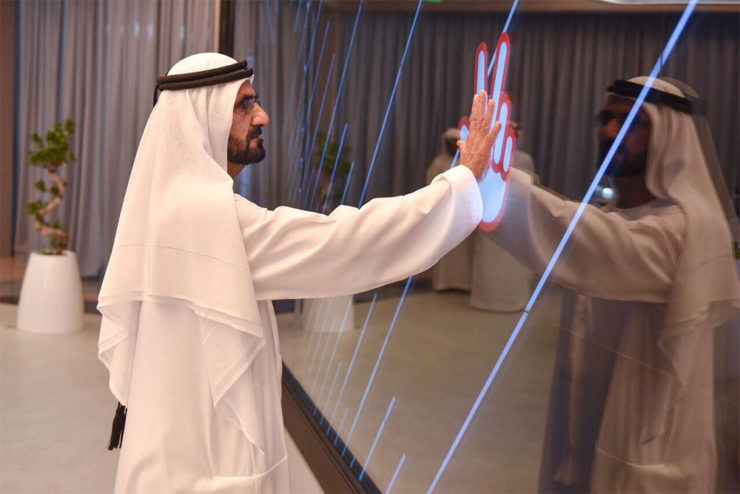
In January 2024, President of the United Arab Emirates (UAE) Mohamed bin Zayed Al Nahyan announced the establishment of the Artificial Intelligence and Advanced Technology Council (AIATC), with a mandate to develop policies and strategies for AI research and related investments.
National Security Advisor Sheikh Tahnoun bin Zayed Al Nahyan has been appointed chairman of the AIATC, while Crown Prince of the Emirate of Abu Dhabi Sheikh Khaled bin Mohamed has been appointed vice-chairman.
Notably, other members of the board are high-profile individuals including Khaldoon Al Mubarak, chairman of Mubadala Holding Company, Jassem Mohammed Buatabh Al Zaabi, creator of the UAE’s radio intelligence agency, Faisal Al Bannai, founder and head of cyber security firm DarkMatter, and Peng Xiao, CEO of G42.
Then in late February 2024, International holding company (IHC), an investment conglomerate headed by Sheikh Tahnoun, announced that it had installed an AI bot named Aiden Insight (AI) as a board observer to help with corporate governance and decision-making.
These moves may seem odd, but they illustrate how artificial intelligence is becoming more prominent in UAE life, primarily due to the facilitation of Tahnoun bin Zayed. The AI bot is based on AI capabilities developed by Microsoft and Sheikh Tahnoun’s company G42, who said the approach would provide “unrivalled data analysis and strategic insight”.
The promise of AI in the Emirates was also brightened on 5 March 2024 when Abu-Dhabi National Oil Company (ADNOC) reported that it had earned $500 million by deploying AI technology in everything from drilling optimisation and reservoir management to corporate decision-making. The report said the technology has also helped reduce carbon dioxide emissions to 1 million tonnes in 2022/2023.
The UAE is also trying to collaborate in AI development with other states. In mid-February 2024, the Advanced Technology Research Council (ATRC) signed a memorandum of understanding with the government of Serbia and the leadership of the Brazilian state of São Paulo. The main objective of this partnership is to use the technical expertise of the ATRC and its affiliated organisations to integrate artificial intelligence into the technical infrastructure of Serbia and Brazil. A separate area of focus is to support the implementation of the ATRC board’s Falcon Large Language Models (LLM) and to explore possible ways of co-operating with ATRC on Falcon-based solutions.
However, not everyone approves of such expansion of Abu Dhabi in the field of AI. For instance, the US attention has been drawn to the aforementioned Peng Xiao. The current CEO of G42 is a crony of Sheikh Tahnoun, whose name was previously mentioned as part of the scandal surrounding the DarkMatter Pegasus firm. At the same time, Peng Xiao, who holds PRC and US citizenship, is one of the main promoters of UAE interests in China. This is of great concern to some politicians in the United States.
For example, Mike Gallagher, chairman of the U.S. House of Representatives Special Committee on Strategic Competition with the Chinese Communist Party (CPC Special Committee), sent a parliamentary request to Secretary of State for Commerce Gina Raimondo in January urging the U.S. government to reconsider export controls for G42 and its subsidiaries because of “extensive business relationships with Chinese military companies. The Wisconsin Republican raised concerns about G42’s relationships with blacklisted Chinese companies, including Huawei Technologies Co. and the Beijing Genomics Institute. Gallagher urged Raimondo to consider imposing sanctions on G42 and thirteen of its subsidiaries and affiliates, including five that he said are linked to Emirati cybersecurity firm DarkMatter. The congressman wrote that Peng Xiao operates a wide network of companies and firms in the UAE and the PRC that are developing dual-use technologies for military purposes, as well as violating human rights through their activities.
Obviously, such pressure has had some effect. In a media statement dated 12 February 2024, Peng Xiao said that his company had reduced its presence in China in response to Washington’s demands. “All our investments in China that were made earlier have already been withdrawn,” the publications quoted Xiao as saying.
At the same time, this is not the first time that the US is worried about national security because of the development of its own AI technologies by the Gulf countries. For example, recently, Prosperity7, an investment fund owned by Saudi Aramco, a Saudi oil company, was forced by Washington to sell its stake in Rain Neuromorphics, a US startup developing artificial intelligence, for reasons of US national security.
Such diplomatic and security challenges are likely to recur, not least because AI is becoming a central element of many states’ national strategies. However, this model clearly does not fit with the US’s global vision of world order, according to which the balance in the political, military and economic environment should be tilted in favour of the US. It seems that sooner or later Washington will have to accept the fact that various countries and corporate structures with sufficient resources are investing and will continue to invest in AI, and that the Americans will soon lose their edge in the field of advanced technologies and security.
Madi Khalis MAALOUF, political observer, especially for online magazine “New Eastern Outlook”